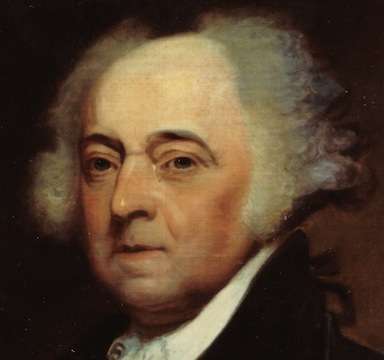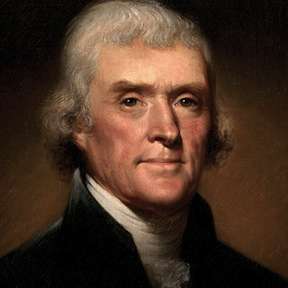On New Year’s Day 1812, former president John Adams picked up his quill pen at his home in Quincy, Mass., and wrote for the first time in years to former president Thomas Jefferson. In the missive, John Adams wishes his old friend Thomas Jefferson many happy new years.
Odd Couple
Jefferson and Adams formed an unlikely friendship, proving that opposites attract. Jefferson, seven years younger than Adams, was a tall, elegant, evasive, slaveholding Virginian. Adams — short, balding, argumentative — hated slavery.
But they agreed on separation from England. They met as delegates to the Continental Congress, where Adams chose Jefferson to write the Declaration of Independence. Later their friendship deepened when they both served as diplomats in London and Paris.
After George Washington left the presidency, Jefferson and Adams were the likely two successors. Adams won as president and Jefferson as vice president.
Then Adams infuriated Jefferson by signing the Alien and Sedition Acts. Congress passed the acts in 1798 when tensions ran high with France. They gave Adams the power to deport aliens deemed dangerous and to restrict criticism of the government. Jefferson viewed them as an attempt to silence his Democratic-Republican Party. So he stormed home to Monticello.
Other differences separated them as well. Adams believed in a strong central government, while Jefferson did not. Jefferson’s ardent support of the French Revolution further alienated Adams. Adams’ support of Tousssaint L’Ouverture in Haiti horrified Jefferson.
After their falling out, Jefferson decided to run for president against Adams, then seeking a second term. He ran a vicious campaign, and Adams gave as good as he got. Jefferson won the presidency in 1800, Adams went home to Quincy and the two men didn’t speak or correspond until that New Year’s Day in 1812.
Homespun
On New Year’s Day in 1812, Adams penned a short, lighthearted note. He began by telling Jefferson he was sending him a gift.
“Dear Sir,” he wrote. “As you are a friend to American manufactures under proper restrictions, especially manufactures of the American kind, I am sending you by the post a packet containing two pieces of homespun lately produced in this quarter by one who was honored in his youth with some of your attention and much of your kindness.”
He finished with, “I wish you Sir many Happy New Years.”
The “two pieces of homespun” were actually two books written by his son, John Quincy Adams. Jefferson replied with a letter fondly recalling when they were fellow laborers in the same cause.
The two ex-presidents resumed their correspondence for the next 14 years. On July 4, 1826, the 90-year-old Adams lay on his deathbed. His last words were “Jefferson still survives.” He was wrong; Jefferson died five hours earlier.
With thanks to Joseph Ellis, Founding Brothers. This story was updated in 2023.



16 comments
Actually, Jefferson viewed them as an attack on the constitution, and everything they had just fought for, not so much his “party”.
Not to mention the lies Jefferson had printed about Adams.
Well Adams was a Federalist, and a Hamilton man early on unfortunately. As we see evident today Federalism won, and federalism destroyed the constitutional republic. So I understand the staunch opposition opponents had of Adams at the time like Patrick Henry, and James Madison, but yes it seems even personal attacks in American politics started back them too.
Then*
That was a nice info piece
Great story. I had always heard they each asked if the other was still alive while on their perspective deathbeds, friends, yet competitors until the bitter end.
I bet that letter had nothing to do with Jefferson ‘stepping’ on Adams’ foot
Same old shit… different century …we as a people must wake up.. vote the correct way…. stop being sheep… in a wave of lies and waste.
[…] his successor, Andrew Jackson, which has happened only two other times among living presidents. His father didn’t attend the inauguration of Thomas Jefferson and Jackson did not attend Martin Van Buren's […]
[…] Benjamin Silliman's analysis of the Weston meteorite formed the foundation of modern scientific research — despite the skepticism of President Thomas Jefferson. […]
[…] Washington left Tobias Lear a lifetime interest in Walnut Tree Farm. He spent the next year sorting through Washington’s papers, some of which went missing. Lear was accused of destroying the papers, including letters that could have damaged Thomas Jefferson. […]
[…] having served as a member of the Continental Congress and U.S. Senate. Among other achievements, Thomas Jefferson appointed him to a seat on the U.S. District […]
[…] to his eventual self-destruction. It was associated with his mentors George Washington and Thomas Jefferson, Washington and Jefferson regularly corresponded about a variety of subjects, including the […]
[…] Benjamin Silliman's analysis of the Weston meteorite formed the foundation of modern scientific research in America — despite the skepticism of President Thomas Jefferson. […]
[…] Washington, had no use for the black leaders of Saint-Domingue. Nor did Adams’ vice president, Thomas Jefferson. He expected black sailors, supercargoes and missionaries to spread the message of freedom into the […]
[…] men hadn't spoken for four years and wouldn't correspond for another eight. But on Jan. 1, 1812, John Adams would make the initial overture. They would renew their friendship, and die on the same day — exactly 50 years after the […]
Comments are closed.